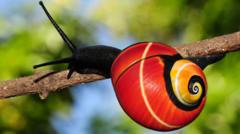In a significant crackdown on wildlife trafficking, Nigeria Customs Service intercepted over 1,600 birds bound for Kuwait, marking a record seizure that underscores the country's ongoing struggle with illegal wildlife trade.
Nigeria's Major Wildlife Trafficking Seizure Highlights Ongoing Crisis

Nigeria's Major Wildlife Trafficking Seizure Highlights Ongoing Crisis
Nigeria Customs Service reports largest wildlife-trafficking bust with 1,600 birds seized at Lagos International Airport.
Nigeria's Customs agency has made headlines after announcing the confiscation of more than 1,600 birds at Lagos International Airport, an action classified as the country's largest wildlife-trafficking seizure to date. The birds, primarily ring-necked parrots and green- and yellow-fronted canaries, were intercepted on July 31, 2023, but the details of this major bust were revealed only recently to protect the ongoing investigation.
According to NCS spokesperson Abdullahi Maiwada, the success of the operation stemmed from routine inspections, which found that the shipment lacked the necessary documentation for legal export. While these bird species are quite common, their export requires adherence to specific regulations, which were evidently bypassed in this instance. The Customs Service announced that those responsible for this unlawful shipment will be pursued legally, and the captured birds are set to be rehabilitated by the National Parks Service before being released back into their natural habitats.
The prevalence of wildlife trafficking in Nigeria is alarming, due to factors such as corruption, porous borders, and ineffective law enforcement. This situation has transformed the nation into a significant transit point for illegal wildlife products including ivory and scales from pangolins, which have a lucrative market in Asia. Nigeria is a participant in the Convention on International Trade in Endangered Species of Wild Fauna and Flora (CITES), yet it remains a center for illicit wildlife trade.
The global illegal wildlife trade generates billions annually, with estimates ranging from $7 billion to $23 billion according to conservation organizations like BirdLife International. Certain species like canaries are especially sought after due to their involvement in popular singing competitions, while rare parrots can command prices of over $1,000 on the black market.
This large-scale operation raises awareness about the critical state of wildlife trafficking in Nigeria and demonstrates the challenges that authorities face in regulating the illegal wildlife market. As efforts continue to combat this trade, the need for stricter enforcement and international cooperation has never been more pronounced.

















